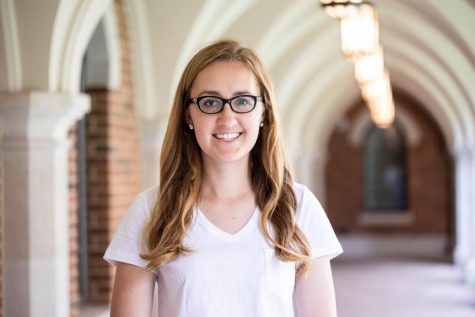Ten Vanderbilt Law School professors signed a letter on Wednesday to the United States Senate asking it to not confirm Judge Brett Kavanaugh as a Supreme Court Justice. The letter, published in the opinion section of the New York Times, stated that Kavanaugh “displayed a lack of judicial temperament” and cited his “lack of commitment to judicious inquiry” as disqualifying for his nomination to the nation’s highest court.
Over 2,400 U.S. law professors signed the letter. Many heard about it through social media or via email from their colleagues, and the number of signees rose throughout the day on Thursday.
Kavanaugh was accused of sexualt assault by three women. One of his accusers, Dr. Christine Blasey Ford, testified before the Senate Judiciary Committee on Thursday, Sept. 27. Law professors cite Kavanaugh’s behavior during his testimony that day in their letter to the Senate.
Five of the 10 Vanderbilt Law School professors who signed the letter were available for comment on Friday regarding why they signed. Many felt that Kavanaugh does not have the temperament or character to serve as a Supreme Court Justice.
“My primary reason for signing the letter was my judgment, after watching all of the Senate hearings on the nomination of Judge Kavanaugh, that he did not have the character, or the honesty, required to serve on the U.S. Supreme Court,” Professor Alex Hurder said.
“I had concerns about what Judge Kavanaugh’s performance in the hearing,” Professor G.S. Hans said. “We have an expectation in the law that judges should be non-partisan, and some of the rhetoric went against that.”
Several of the professors were surprised by Kavanaugh’s behavior and statements during the hearing, specifically how he treated Senator Amy Klobuchar.
“Judge Kavanaugh’s refusal to answer questions about the alleged sexual assaults and about his history with alcohol not only undermined his credibility, but his behavior was contemptuous of the Senate,” Professor Hurder said. “His question to Senator Klobuchar demanding to know, “Do you drink too much?” was contemptuous and sexist.”
Professor Beverly Moran also commented on Kavanaugh’s response to Klobuchar’s question.
“It’s the sort of thing that if a student did it in a moot court, you would take that student aside and say, ‘You know, a judge would crucify you for that,’” Moran said.
“I was appalled by the tone he took, I was appalled by the way he attacked the Senators for their questions at his hearing two weeks earlier, I was appalled by the conspiracy theories and the sharp partisan tone, Professor Daniel Sharfstein said. “I also think that it was full of readily provable un-truths.”
Professors commented on the implications that the Kavanaugh hearing has for the future of the Supreme Court.
“Many people’s rights are controlled by what those nine people do, and if we don’t as a country respect our Supreme Court and our justices, that’s not good for the country,” Moran said.
“I think that Kavanaugh’s testimony on Thursday did great damage to an institution that’s essential to the republic and to the values that unite us as Americans,” Sharfstein said.
Dr. Ellen Wright Clayton holds appointments in the law and medical schools at Vanderbilt. She commented on the partisanship of the nomination process.
“This was a brutal process,” Dr. Clayton said. “I was also around when Clarence Thomas was nominated, and it is disheartening to see this again. This makes clear how political and partisan this process is. I’m currently discouraged. I hope that we as citizens can reclaim the country we want this to be.”
Dr. Clayton also commented on the implication of the hearings for women.
“I’m concerned about what his nomination means for women,” Clayton said. “We have a lot of work to do, and this is not a step in the right direction.”
Vanderbilt Law School professors recommended that students contact their senators and vote in the upcoming midterm elections if they want to engage with this topic.
“It’s really important to give feedback as constituents, and I think that a phone call is the most effective way of doing so,” Professor Hans said. “Election day is in only a month, and that will be a time for students to engage as well.”
“This nomination and the Senate that’s confirming Kavanaugh is the result of extraordinary small numbers of voters either choosing to go to the polls or choosing not to go to the polls,” Professor Sharfstein said.



